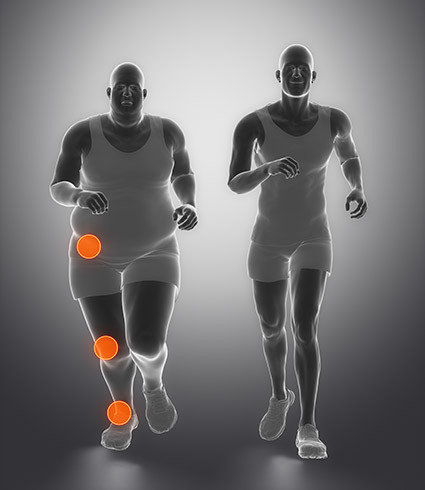Exercise therapy is also an important component for ensuring weight loss and a healthy transformation. Unfortunately, activity can be quite difficult and sometimes even impossible for obese individuals due to their weights. Therefore, first the physical limitations should be identified as specific to the person, and then a unique exercise program should be prepared. Otherwise, exercise may lead to harmful effects rather than beneficial effects on the cardiovascular system and the joints.
The more intense the activity the more calories will be burned. 8000 calories need to be burned for burning 1 kg fat. Initially walking at a slightly increasing pace will be a good choice for obese individuals. Combining increased physical activity with a good diet will increase your chance to successfully and permanently lose weight.
For being able to make sports a part of your life, you should determine what activities are compatible with your daily routine. However, activity can become a part of your daily life in this way, and then can turn into a long-term habit.
In the simplest term, try to walk up one or two flights instead of using the elevator. It will be a good change to reduce driving by reaching destinations you intend to go by public transport vehicles, and walking to a certain extent. If the places where you regularly shop are within walking distance, leave your car at home. Many studies have shown that urban vehicles use mostly involves just a few kilometers especially in rush hours. However, this is at least the distance we need to walk every day. An average adult need to perform moderate physical activity for at least 30 minutes a day and 5 days a week, for being able to lose weight and maintain his/her weight.

Moderate physical activity means activity that causes the person to warm up and increases his/her heart rate. Such an activity is called cardio exercise and has preventive effects on heart diseases and diabetes.
However, many obese patients have to exercise for an average period of 45 to 60 minutes a day to stop weight gain. after weight loss, mild exercise for a period of 60 to 90 minutes a day is necessary to prevent weight regain. This activity may be both continuous and for periods of ten minutes.
Children need to do moderate activity for a period of 60 minutes a day, as well. Such activities can be in the form of cycling, stair climbing, gardening, swimming, or exercising in the gym. Besides increasing the activity, obese people also need to reduce the time they spend by sitting and sedentarily. This usually requires the reduction of time spent in front of the computer and TV screens.
If you have an advanced obesity problem, and if your health is not good enough, you should definitely do the physical activities recommended by a health care professional, after the required medical screening procedures.
Increasing the physical activity and reducing the caloric intake will help you both lose weight and maintain your weight. Besides these, your risks of getting heart diseases and heart attack will also decrease. It has been proven that the risks of getting diabetes, breast cancer, colon cancer, and uterine cancer decrease as well. Your coronary and pulmonary systems will be strengthened and will begin to work better. Your muscles and joints will be strengthened, and your bone loss will slow down. You will feel more energetic, your insomnia problem will decrease (if you have any), and you will begin to be less affected by stress.
There are four main types of physical activity: aerobic; muscle-strengthening; bone-strengthening; stretching. The points to take into consideration are that you should definitely start with mild exercises and gradually increase the intensity if you have not exercised before, and should start exercising after receiving the opinion of the relevant physicians if you have any heart or lung disease.
